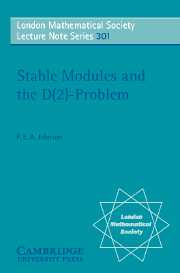Book contents
- Frontmatter
- Contents
- Acknowledgements
- Introduction
- 1 Orders in semisimple algebras
- 2 Representation theory of finite groups
- 3 Stable modules and cancellation theorems
- 4 Relative homological algebra
- 5 The derived category of a finite group
- 6 k-invariants
- 7 Groups of periodic cohomology
- 8 Algebraic homotopy theory
- 9 Stability theorems
- 10 The D(2)-problem
- 11 Poincaré 3-complexes
- Appendix A The D(2)-property for free groups
- Appendix B The Realization Theorem
- References
- Index
9 - Stability theorems
Published online by Cambridge University Press: 04 August 2010
- Frontmatter
- Contents
- Acknowledgements
- Introduction
- 1 Orders in semisimple algebras
- 2 Representation theory of finite groups
- 3 Stable modules and cancellation theorems
- 4 Relative homological algebra
- 5 The derived category of a finite group
- 6 k-invariants
- 7 Groups of periodic cohomology
- 8 Algebraic homotopy theory
- 9 Stability theorems
- 10 The D(2)-problem
- 11 Poincaré 3-complexes
- Appendix A The D(2)-property for free groups
- Appendix B The Realization Theorem
- References
- Index
Summary
In this chapter we prove three of the six theorems stated in the Introduction. We have seen that stabilization induces a tree structure on the stable module Ω3(Z). Two-dimensional homotopy types possess an analogous tree structure; homotopy types at the bottom level are said to be minimal. We say that G has the realization property when all algebraic 2-complexes over Z[G] are geometrically realizable. The first of our results is then:
Theorem II: The finite group G has the realization property if and only if all minimal algebraic 2-complexes are realizable.
Theorem II is a general condition on homotopy types. It is more useful to have a criterion for realizability in terms of homotopy groups. The second result of this Chapter gives a sufficient condition on the minimal modules in Ω3(Z) for G to possess the realization property. We say that a module J ∈ Ω3(Z) is realizable when for some finite 2-complex there is an isomorphism of Z[G]- modules is said to be full when the natural map is surjective; we also prove:
Theorem III: If each minimal module J ∈ Ω3(Z) is both realizable and full, then G has the realization property.
We proceed to both results via stabilization; at the geometric level this is simply the operation
At the algebraic level, the straightforward analogue of geometric stabilization simply adds a copy of Z[G] to the ‘algebraic π2’, replacing
Algebraically, the situation is slightly more complicated, in that it is also necessary to consider ‘internal stabilizations’ which do not alter congruence classes.
Information
- Type
- Chapter
- Information
- Stable Modules and the D(2)-Problem , pp. 193 - 223Publisher: Cambridge University PressPrint publication year: 2003
